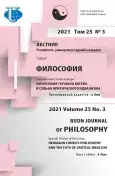Guarding Thought against Self-Destruction. Contradiction and Identity in Cohen and Hegel
- Авторлар: Wiedebach H.
- Шығарылым: Том 25, № 3 (2021): HERMANN COHEN'S PHILOSOPHY AND THE FATE OF CRITICAL IDEALISM
- Беттер: 394-403
- Бөлім: HERMANN COHEN'S PHILOSOPHY AND THE FATE OF CRITICAL IDEALISM
- URL: https://journal-vniispk.ru/2313-2302/article/view/325009
- DOI: https://doi.org/10.22363/2313-2302-2021-25-3-394-403
- ID: 325009
Дәйексөз келтіру
Толық мәтін
Аннотация
Hermann Cohen's Logic of Pure Knowledge and G. W. F. Hegel's Science of Logic each use in their way the means of thought of negation and contradiction to unfold the philosophical dynamic: a fragile interplay between self-endangerment and self-preservation of thought. Here, the proximity and difference of the two authors are extended. The proximity lies in methodological negativism. The difference is in the significance of the principle of continuity. According to Cohen and Hegel as well, thinking proceeds exclusively, as Kant called it, synthetically. The exclusion of contradiction, limited to analytical judgments, has only marginal significance. But the commonality does not eliminate the differences. As Hegel puts it, contradiction is a principle of mediation and finally results in "self-dissolution"; it carries within itself a direction of logical "reconciliation." Per Cohen, contradiction is a principle of "annihilation" (annihilatio) of approaches to a determination that threatens any form of "identity." The turn Hegel put in contradiction itself, regarding in it a unity of positivity and negativity, has no direct counterpart in Cohen. Nevertheless, for him, too, the "judgment of contradiction" becomes the active basis of all cognitive thought. By exercising a contradiction-destroying "activity," the judgment of contradiction "protects," indeed "generates," the real possibility of cognition. The annihilation of the non-identical sets free the fundamental "judgment of origin" with which cognition finds its beginning. The principle of continuity taken over from Leibniz corresponds to it. Just this principle has now again no direct correspondence with Hegel.
Негізгі сөздер
Авторлар туралы
Hartwig Wiedebach
Хат алмасуға жауапты Автор.
Email: wiedebach@posteo.de
Dr. Phil., Privatdozent
37, Georg-Boehringer-Weg, Goeppingen, 73033, GermanyӘдебиет тізімі
- Zeidler KW. Prolegomena zur Wissenschaftstheorie. Würzburg: Königshausen und Neumann; 2000.
- Zeidler KW. Stufen der Apriorität oder apriorische Synthesis? In: Zeidler KW, Krijnen C, editors. Reflexion und konkrete Subjektivität. Beiträge zum 100. Geburtstag von Hans Wagner (1917-2000). Vienna: Ferstl und Perz; 2017. p. 331-354.
- Wiedebach H. Widerspruch und Identität bei Cohen und Hegel. Schutz des Denkens vor Selbstvernichtung. In: Rendl M, König R, editors. Schlusslogische Letztbegründung. Festschrift für Kurt Walter Zeidler zum 65 Geburtstag. Berlin: Peter Lang; 2020. p. 297-306.
- Wiedebach H. Logic of Science vs. Theory of Creation: The 'Authority of Annihilation' in Hermann Cohen’s Logic of Origin. The Journal of Jewish Thought and Philosophy. 2010;(18): 107-120.
- Cohen H. Werke. Bd. 6: System der Philosophie. Erster Teil: Logik der reinen Erkenntnis (2. Aufl. 1914). Holzhey H, editor. Hildesheim, Zürich, New York: Georg Olms, 2005.
- Holzhey H. Cohen und Natorp. Bd. 1. Basel/Stuttgart: Schwabe; 1986.
- Gordin J. Untersuchungen zur Theorie des unendlichen Urteils. Berlin: Akademie-Verlag; 1929.
- Cohen H. Kants Theorie der Erfahrung. In: Cohen H. Werke. Bd. 1.3: Erste Auflage 1871. Hildesheim, Zürich, New York: Georg Olms; 1987.
- Hegel GWF. Wissenschaft der Logik. Bd. 1-2. Lasson G, editor. Hamburg: Felix Meiner Verlag; 1963.
- Holzhey H. Entzauberung des Pantheismus. Cohens Kritik an Hegels und Schellings Metaphysik. In: Krijnen C, Pätzold D, editors. Der Neukantianismus und das Erbe des deutschen Idealismus. Die philosophische Methode. Würzburg: Königshausen und Neumann; 2002. p. 49-64.
- Bonsiepen W. Hegel und der Neukantianismus. In: Wyrwich T, editor. Hegel in der neueren Philosophie. Hamburg: Meiner; 2011. p. 47-112.
- Cohen H. Werke. Bd. 7: System der Philosophie. Zweiter Teil: Ethik des reinen Willens. Hildesheim, Zürich, New York: Georg Olms, 2012.
- Wiedebach H. The National Element in Hermann Cohen's Philosophy and Religion. Boston, Leiden: Brill; 2012.
- Cohen H. Werke. Bd 5/I: Das Prinzip der Infinitesimal-Methode und seine Geschichte. Ein Kapitel zur Grundlegung der Erkenntniskritik. Hildesheim, Zürich, New York: Georg Olms, 2012.
- Cohen H. Hermann Cohen’s Schriften zur Philosophie und Zeitgeschichte. Bd. 1. Berlin: Akademie-Verlag; 1928.
Қосымша файлдар









